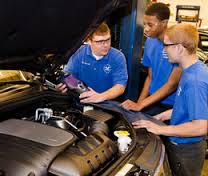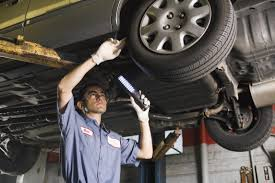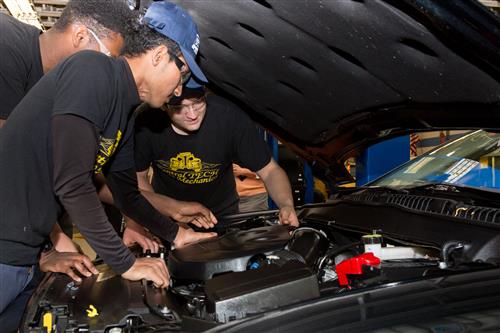Automotive Mechanics Technology
Page Navigation
- Erie High School
- Overview
-
Automobile/Automotive Mechanics Technology/Technician



CIP Code 47.0604
Pathway: Engineering and Industrial Technology
Instructor: Mr. Peter Rastatter
Length: 4 years
Certifications: OSHA, S/P2 Safety and Pollution Prevention, S/P2 Automotive, Automotive Service Excellence (ASE), Preparation for state inspection.
Introduction – Program of Study
Automotive service technicians inspect, maintain, and repair automobiles and light trucks that run on gasoline, electricity, or alternative fuels. Responsibilities of automotive service technicians and mechanics have evolved from simple mechanical repairs to high-level technology-related work. The increasing sophistication of automobiles requires workers who are able to use computerized shop equipment and work with electronic components while maintaining their skills with traditional hand tools. As a result, automotive service workers are usually called technicians rather than mechanics.
Integrated electronic systems and complex computers regulate vehicles and their performance while on the road. Technicians must have an increasingly broad knowledge of the complexity of components within the vehicles. They also must be able to work with electronic diagnostic equipment, digital manuals and reference materials. While most automotive service technicians work a standard 40 hour week, some may work longer hours.
Service technicians use a variety of tools in their work. Employers furnish expensive power tools, engine analyzers, and other diagnostic equipment. Computers are also commonplace in modern repair shops. Through the internet or software packages, most shops receive automatic updates to technical manuals and access to manufacturers’ service information, technical service bulletins, and other databases that allow technicians to stay current with industry standards.
Most employers regard the successful completion of a training program in automotive service technology as the best preparation for trainee positions. Graduates of these programs may need further training to become qualified. Some high school programs participate in Automotive Youth Education Service (AYES), a partnership between high school automotive repair programs, automotive manufacturers, and franchised automotive dealers. All AYES high school programs are certified by the National Institute for Automotive Service Excellence. Students who complete these programs are well prepared to enter entry level technician positions or to advance their technical education. Courses in automotive repair, electronics, physics, chemistry, English, computers, and mathematics provide a good educational background for a career as a service technician. Postsecondary automotive technician training programs usually provide intensive career preparation through a combination of classroom instruction and hands on practice. Community college programs usually award a certificate or an associate degree. Acquiring National Institute for Automotive Service Excellence (ASE) certification is important for those seeking work in large, urban areas. Revised July 2013 2
The ability to diagnose the source of a problem quickly and accurately requires good reasoning ability and a thorough knowledge of automobiles. Many technicians consider diagnosing difficult problems as one of their most challenging and satisfying duties. For trainee automotive service technician jobs, employers look for people with strong communication and analytical skills. Technicians need reading, mathematics, and computer skills to study technical manuals. They must also study to keep up with new technology and learn new service and repair procedures and specifications.
Assumptions of this Program of StudyHigh quality programs should meet the following standards:
1. Promote positive working relationships.
2. Implement a curriculum that fosters all areas of skill development
3. Use appropriate and effective teaching approaches.
4. Provide ongoing assessments of student progress.
5. Employ and support qualified teaching staff.
6. Establish and maintain relationships and use resources of the community.
7. Provide a safe and healthy learning environment.
8. Implement strong program organization and supervision policies that result in high quality teaching and learning.
9. Integrate academic skills and aptitudes necessary for postsecondary education, gainful employment and a foundation of lifelong learning.
CIP Code 47.0604
Automobile/Automotive Mechanics Technology/Technician
This is an instructional program that prepares individuals to apply technical knowledge and skills to engage in the servicing and maintenance of all types of automobiles and light trucks. This program includes instruction in the diagnosis and testing, including computer analysis, of malfunctions in and repair of engines, fuel, electrical, cooling and brake systems, drive trains and suspension systems. Instruction is also given in the adjustment and repair of individual components and systems such as fuel system components and air conditioning, and includes the use of technical repair information and the procedures for state inspection.

